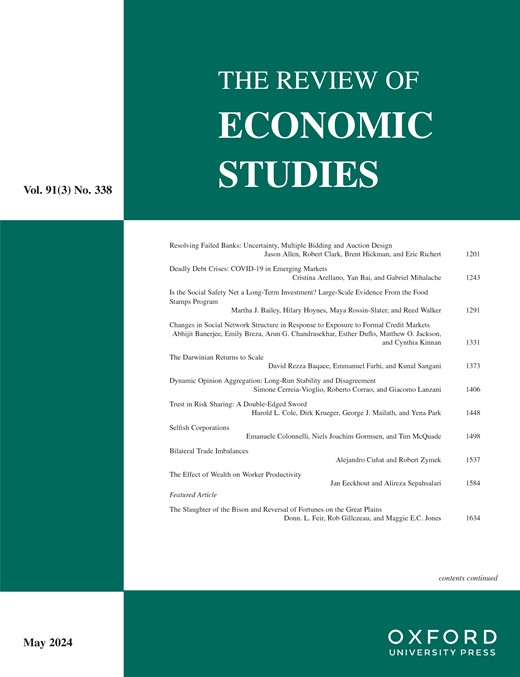Inference for Ranks with Applications to Mobility across Neighbourhoods and Academic Achievement across Countries
IF 6.4
1区 经济学
Q1 ECONOMICS
引用次数: 4
Abstract
Abstract It is often desired to rank different populations according to the value of some feature of each population. For example, it may be desired to rank neighbourhoods according to some measure of intergenerational mobility or countries according to some measure of academic achievement. These rankings are invariably computed using estimates rather than the true values of these features. As a result, there may be considerable uncertainty concerning the rank of each population. In this paper, we consider the problem of accounting for such uncertainty by constructing confidence sets for the rank of each population. We consider both the problem of constructing marginal confidence sets for the rank of a particular population as well as simultaneous confidence sets for the ranks of all populations. We show how to construct such confidence sets under weak assumptions. An important feature of all of our constructions is that they remain computationally feasible even when the number of populations is very large. We apply our theoretical results to re-examine the rankings of both neighbourhoods in the U.S. in terms of intergenerational mobility and developed countries in terms of academic achievement. The conclusions about which countries do best and worst at reading, math, and science are fairly robust to accounting for uncertainty. The confidence sets for the ranking of the fifty most populous commuting zones by measures of mobility are also found to be small. These confidence sets, however, become much less informative if one includes all commuting zones, if one considers neighbourhoods at a more granular level (counties, census tracts), or if one uses movers across areas to address concerns about selection.应用于跨社区流动和跨国家学术成就的排名推断
摘要通常需要根据每个种群的某些特征值对不同的种群进行排序。例如,可能希望根据代际流动性的某种衡量标准对社区进行排名,或者根据学术成就的某种衡量标准对国家进行排名。这些排名总是使用估计而不是这些特征的真实值来计算的。因此,每个人口的排名可能有相当大的不确定性。在本文中,我们通过构造每个总体的秩的置信集来考虑考虑这种不确定性的问题。我们既考虑构造特定种群秩的边缘置信集问题,也考虑构造所有种群秩的同时置信集问题。我们展示了如何在弱假设下构造这样的置信集。我们所有构造的一个重要特征是,即使种群数量非常大,它们在计算上仍然是可行的。我们运用我们的理论结果,重新审视了美国两个社区在代际流动性方面的排名,以及发达国家在学术成就方面的排名。关于哪些国家在阅读、数学和科学方面表现最好和最差的结论,在考虑不确定性时相当有力。研究还发现,按流动性衡量的50个人口最多的通勤区排名的置信度也很小。然而,如果一个人把所有的通勤区都包括在内,如果一个人在更细粒度的层面上考虑社区(县、人口普查区),或者如果一个人使用跨区域的搬家者来解决选择问题,那么这些置信度集的信息量就会大大减少。
本文章由计算机程序翻译,如有差异,请以英文原文为准。
求助全文
约1分钟内获得全文
求助全文
来源期刊

Review of Economic Studies
ECONOMICS-
CiteScore
10.40
自引率
3.40%
发文量
75
期刊介绍:
Founded in 1933 by a group of young British and American economists, The Review of Economic Studies aims to encourage research in theoretical and applied economics, especially by young economists. Today it is widely recognised as one of the core top-five economics journals. The Review is essential reading for economists and has a reputation for publishing path-breaking papers in theoretical and applied economics. The Review is committed to continuing to publish strong papers in all areas of economics. The Editors aim to provide an efficient and high-quality review process to the Review''s authors. Where articles are sent out for full review, authors receive careful reports and feedback. Since 1989 The Review has held annual May Meetings to offer young students in economics and finance the chance to present their research to audiences in Europe.
 求助内容:
求助内容: 应助结果提醒方式:
应助结果提醒方式:


